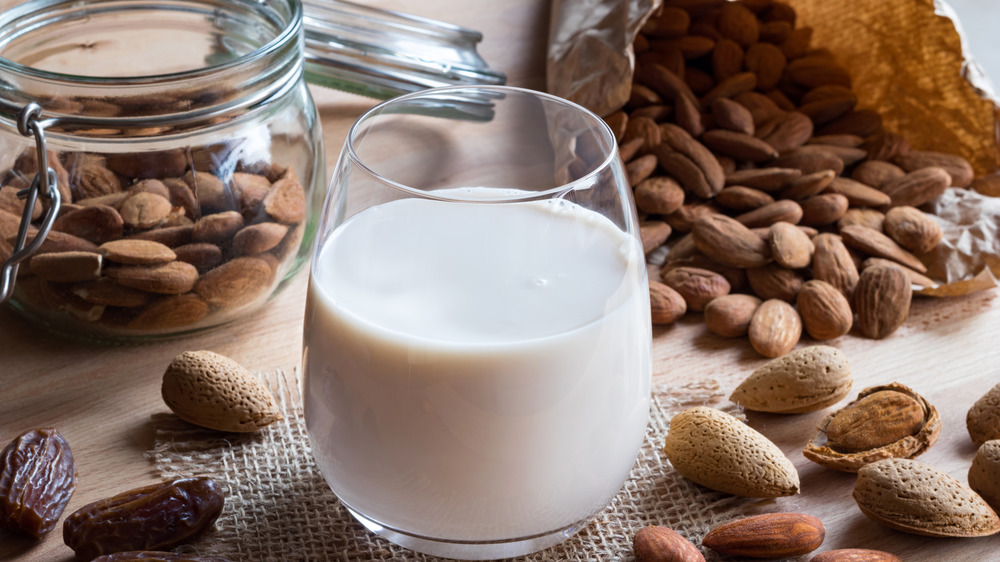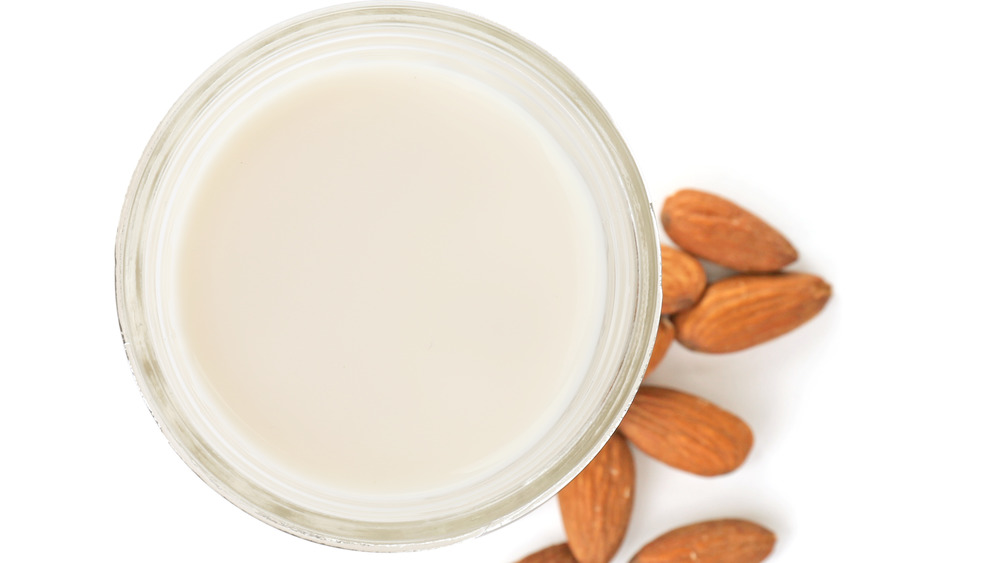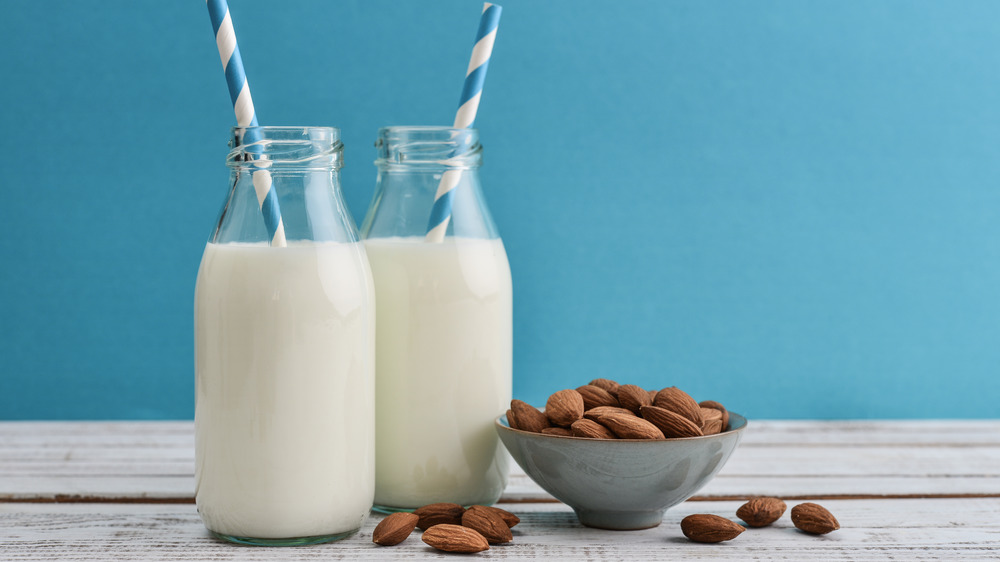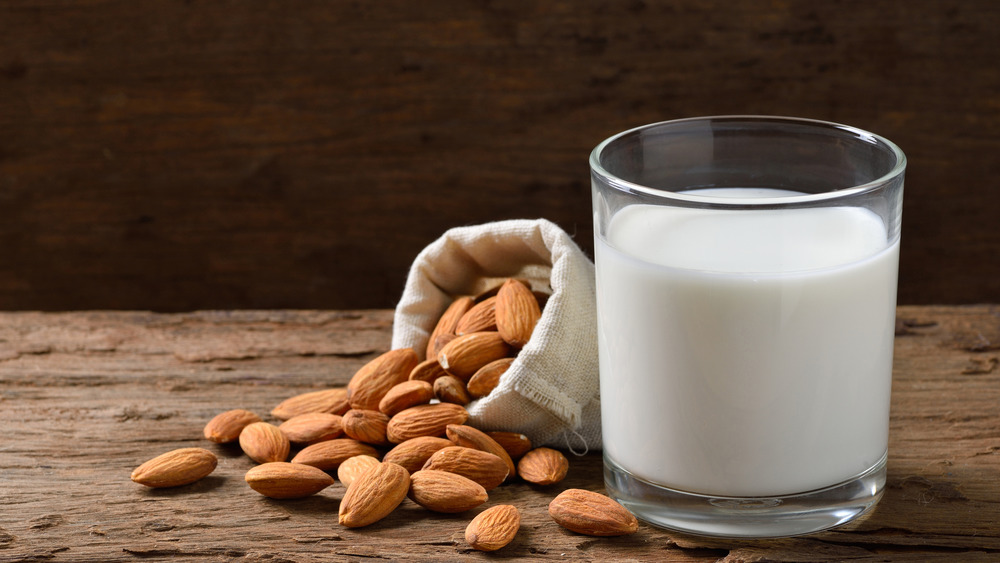What Happens To Your Body When You Drink Almond Milk Every Day
Almond milk has become a trendy, dairy-free option for many who either prefer to avoid dairy or are simply looking to drink their coffee with an alternative that's either better or as good as traditional choices. When it comes to caloric content, a cup of almond milk is somewhere around 30 calories while the same amount of skim milk will be around 86 calories, to be precise (via Forbes).
As per Healthline, almond milk also has a bunch of perks, such as the fact that the almond milk varieties that you get off the shelves are often enriched with nutrients like vitamin E, calcium, and vitamin D. When selecting an almond milk to replace regular milk, it's good to choose ones that don't contain excessive amounts of sugar, though occasionally a splash of sweetened almond milk in your coffee serves as a nice sweetener and cream in one. Almond milk is a good option because it can easily replace dairy and is readily available for the most part. In fact, it's been linked to health benefits such as possibly helping you fight against cancer and keeping your glucose levels in check thanks to the fact that it's low in sugar (via SFGate).
Not all cartons of almond milk are created equal
It's indisputable that almond milk has now become a rather popular alternative if you are dairy-free. According to Popular Science, the demand of almond milk rose up by 250 percent between 2010 and 2015. However, consuming almond milk on an everyday basis requires you to be a bit mindful because almond milk in general isn't the same. Basically, each brand will have a separate nutritional profile and you need to pay attention to the labels on that milk carton you've been eyeing. UCSF Office of Sustainability explains some varieties of almond milk may cause digestive issues because of a thickening agent called carrageenan, something you should be wary of.
Additionally, almond milk is suitable for some but not a sustainable choice for others especially if you're looking at giving almond milk to infants who need far more nutrition than what's on offer in a cup of almond milk (via Byrdie.)
"Almond milk isn't as bad as people make it seem, it is actually very nutritious," Valerie Agyeman, a registered dietitian nutritionist, told Mashed. "Don't get me wrong, it isn't as nutritious as cow's milk, but enriched almond milk comes pretty close to hitting the nutritional content of cow milk." This means that as a healthy adult, you may lose weight on account of the relatively lower calories in almond milk without missing out on major nutrients such as calcium and Vitamin E as long as you make an informed choice at the grocery store.
Almond milk isn't great for the environment
One of the major drawbacks of drinking almond milk on a regular basis is that you'd be contributing to damaging the environment. According to the Guardian, several plant-based milk choices, including almond milk, are really harmful. Almonds need a lot of water for production: as much as 130 pints of water for just one glass of almond milk. Plus, almond milk is bad for the bees.
It's estimated that around 70 percent bees focus on pollinating almonds each spring and last year, around one-third of them perished by the end of the season on account of this coupled with other environmental issues. As reported by The Cut, the mortality rate for bees that pollinated almonds was alarmingly high and could be attributed to the sheer amount of pesticides used for cultivating almond crops.
However, dairy itself isn't too great for the planet either and producing a single glass causes three times the greenhouse gas emissions in comparison to other dairy-free milk alternatives. It's clear, though, that almond milk and other plant-based alternatives are better for the environment than dairy. In a face-off though, the best options for the environment, as per Insider, are hemp and oat milk.
Almond milk has pros and cons
Almond milk is not very satisfying on account of its low protein content. A cup of almond milk has only one gram of protein while a serving of regular milk has eight grams of protein (via Very Well Fit). Also, its benefits don't quite stack up if you compare it to an ounce of almonds. The latter has six grams of protein, three grams of fiber, and 12 grams of monounsaturated and polyunsaturated fats (via Mother Jones).
If you're looking simply to get the nutritional benefits of almonds, it may make sense for you to eat almonds on a regular basis instead of solely relying on almond milk. However, the pros of almond milk are aplenty, such as better skin and the fact that it is easy to prepare at home (via LifeHack). All you need to do is to grind almonds, blend them with water, and filter the contents with a strainer for milk that's rather delicious.
Incorporating almond milk into your diet, at the end of the day, comes down to your personal preferences. Just stay mindful and know what you're buying the next time you head out on a grocery run.



